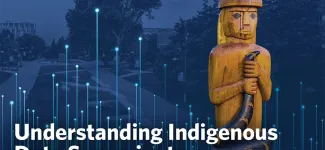As I sit down to write this article, I want to first express my deep gratitude for the opportunity to live and work on the unceded lands and territories of the Musqueam, Squamish, and Tsleil-Waututh Nations.
In honour of Indigenous Heritage Month during the month of June and Indigenous Peoples Day on June 21, we wanted to share the importance of Indigenous data sovereignty. Data has become an incredibly valuable asset in today's world. From personal information to traditional knowledge, data plays a crucial role in shaping narratives, driving decision-making, and preserving cultural identities. In writing this article, we hope to emphasize the importance of ensuring data is managed in ways that honour and respect Indigenous peoples.
The movement for Indigenous data sovereignty is gaining traction with various initiatives forming across the globe. For example, in Canada, there is the First Nations Information Governance Centre (FNIGC). There was also a recent study conducted by First Nations knowledge holders from British Columbia, technical staff from BC First Nations, and researchers from UBC and SFU explored Indigenous data sovereignty within the context of BC's salmon-bearing ecosystems. This collaborative effort highlights the importance of Indigenous control over their data, especially concerning vital environmental and cultural resources. Additionally, at UBC, the Indigenous Research Support Initiative (IRSI) provides further insights into Indigenous data governance.
Before we move on towards exploring more, let's visit the official definition of Indigenous and First Nations data sovereignty from The First Nations Data Governance Strategy document:
"Indigenous and First Nations data sovereignty: is the concept of First Nations authority, right, power to govern as sovereign Nations and make decisions or laws on the ownership, control, collection, access, analysis, application, possession and use of their own data". Indigenous data sovereignty "is linked with Indigenous peoples' right to maintain, control, protect and develop their cultural heritage, Traditional Knowledge and traditional cultural expressions, as well as their right to maintain, control, protect and develop their intellectual property over these." (The First Nations Data Governance Strategy, 2020)
According to the Strategy, Indigenous data sovereignty aims to address historical and contemporary issues related to the misuse and misrepresentation of Indigenous data. By emphasizing the principles of Indigenous Data Sovereignty, it seeks to empower Indigenous communities, protect their privacy, build their capacity, and improve overall data governance.
Principles of Indigenous Data Sovereignty
The FNIGC's principles of OCAP® (Ownership, Control, Access, and Possession) serve as a foundation for Indigenous data sovereignty in Canada, guiding research and data collection involving First Nations.
- Ownership. First Nations should own their data and have the ultimate authority over how it is used.
- Control. Indigenous communities must have control over the collection, storage, analysis, and dissemination of their data.
- Access. Indigenous peoples should have access to data relevant to their communities and be able to use it to make decisions that benefit their members.
- Possession. This principle emphasizes the importance of Indigenous communities physically possessing their data, ensuring it remains under their control.
The key objectives of Indigenous Data Sovereignty
The objectives of Indigenous data sovereignty are broad and multifaceted. It starts with giving priority to self-determination, allowing First Nations to manage their data independently in ways that respect cultural values and governance systems. The framework also emphasizes the importance of protecting privacy and maintaining ethical standards in data collection to prevent misuse. Addressing historical injustices is crucial, aiming to correct past wrongs and promote fair research practices where data was previously collected without consent. Capacity building is key too, focusing on equipping communities with the skills to manage data effectively for sustainable development. Lastly, improving data governance involves advocating for best practices that align with Indigenous values and legal traditions, ensuring secure and efficient data management frameworks.
Everyone can continue to learn about Indigenous data governance and the importance of data privacy, you can do so by exploring the First Nations Information Governance Centre(FNIGC) and its training opportunities. Additionally, it is essential to grasp the bigger picture of data privacy. You can learn more by browsing the UBC's Privacy Matters library of resources or visit X̱wi7x̱wa Library, Canada's only Indigenous branch of an academic library located at UBC. These resources are key for fostering informed discussions and collectively advancing respectful data practices.
Check out additional resources to continue learning about Indigenous data governance and the importance of data privacy:
- First Nations Information Governance Centre
- X̱wi7x̱wa Library
- Indigenous Research Support Initiative (IRSI)
- Privacy Matters @UBC
Article written by Lili Sabirova



